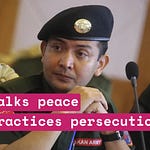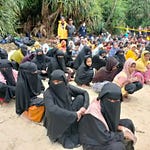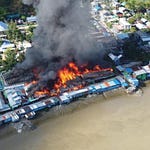In this episode, Shafiur Rahman speaks to Dr Ambia Parveen, Vice Chair of the European Rohingya Council, about the recent announcement by Bangladeshi and Myanmar authorities claiming that 180,000 Rohingya refugees have been cleared for return. Dr Parveen offers a sharply critical assessment of this move, calling it “political drama” rather than a serious step toward repatriation.
She condemns the premature announcement as lacking transparency, dismisses it as a “desperate” attempt by Bangladesh to seek validation, and warns of the dangers of retraumatising the Rohingya population. Her withering critique of the Bangladesh government's motives and methods is especially noteworthy, highlighting how such announcements are often staged for optics - aimed more at donors and diplomatic brownie points than genuine resolution.
This conversation also touches on the roles of the Arakan Army, the failures of past repatriation efforts, and how the entire humanitarian ecosystem - including INGOs and the UN - may be perpetuating rather than solving the crisis. Dr Parveen’s analysis is scathing, insightful, and unflinching. She suggested that solving it might threaten the structures that have grown around managing the crisis, saying: “They all benefit... If you have the solution, these organisations... will not run. They need to create a conflict.”
Lastly, she emphasised that Rohingyas were not involved in the process, just as they hadn’t been in the past, and accused Bangladesh of hiding the truth and pushing a plan without regard for the lived realities or desires of the refugees. While expressing gratitude that Bangladesh hosted the Rohingya, she asserted that Bangladesh is “not 100% willing to solve the Rohingya crisis”, in part due to geopolitical pressures and a lack of genuine political interest in long-term solutions.
Host's Note: A Broader Critique of Repatriation
While Dr Ambia Parveen offers a powerful and critical account of the latest repatriation announcement, I want to add my own reflections.
Much of the mainstream discourse treats the Rohingya crisis as a failure of diplomacy or a breakdown in negotiations. But this framing obscures the deeper political economy at play — particularly in Bangladesh.
Why has the idea of repatriation been kept alive rhetorically, even when everyone knows it's unworkable given the conditions on the ground? Because it serves a set of domestic and international interests: it allows Bangladesh to externalise responsibility, maintain control through securitised camps, and attract continued humanitarian funding — all while avoiding integration or enfranchisement of the Rohingya.
The 2023 “pilot repatriation project” is a case in point. Bangladesh attempted to convince Rohingya in Teknaf they were being considered for resettlement — only for them to discover they were actually listed for return. A Myanmar verification team was brought in for formal interviews, and refugees were even offered $2000 to accept repatriation. Does this look like groundwork for a viable return? It was about optics: getting a few families over the border to stage a symbolic repatriation. It was performance - to show “progress” to donors, the international community, and a domestic audience fatigued by the crisis.
In this context, repatriation itself becomes spectacle. Each round of talks, each list of “verified” returnees, is a performance. The camps, meanwhile, are not neutral humanitarian spaces but mechanisms of containment — and bargaining chips in Bangladesh’s geopolitical toolkit.
My argument in Himal Southasian frames the Rohingya not just as a marginalised group but as a surplus population: not needed in the formal economy, too politically risky to integrate, but too symbolically valuable to be allowed to disappear. In this light, non-repatriation is not a failure — it's policy. A strategy to keep this population economically marginal, spatially confined, and politically disenfranchised.
Equally overlooked is the vast camp economy and the NGO industrial complex. Aid infrastructures that claim to “help” often entrench dependency, discipline behaviour, and circulate resources through a tightly controlled ecosystem of UN agencies, international NGOs, Bangladeshi elites, and local contractors. Dependency and control are not accidental. They are designed outcomes. Dr Parveen shares this view in the podcast.
And finally, while the dominant narratives often strip Rohingya of political agency, they remain active subjects: speaking, resisting and refusing imposed ‘solutions’ — even under constraint. And this was especially on display after the theatrics at the Bimstec meeting in Thailand.
Take home message: If you thought repatriation is stalled by circumstance - it isn’t. It’s stalled by design.









